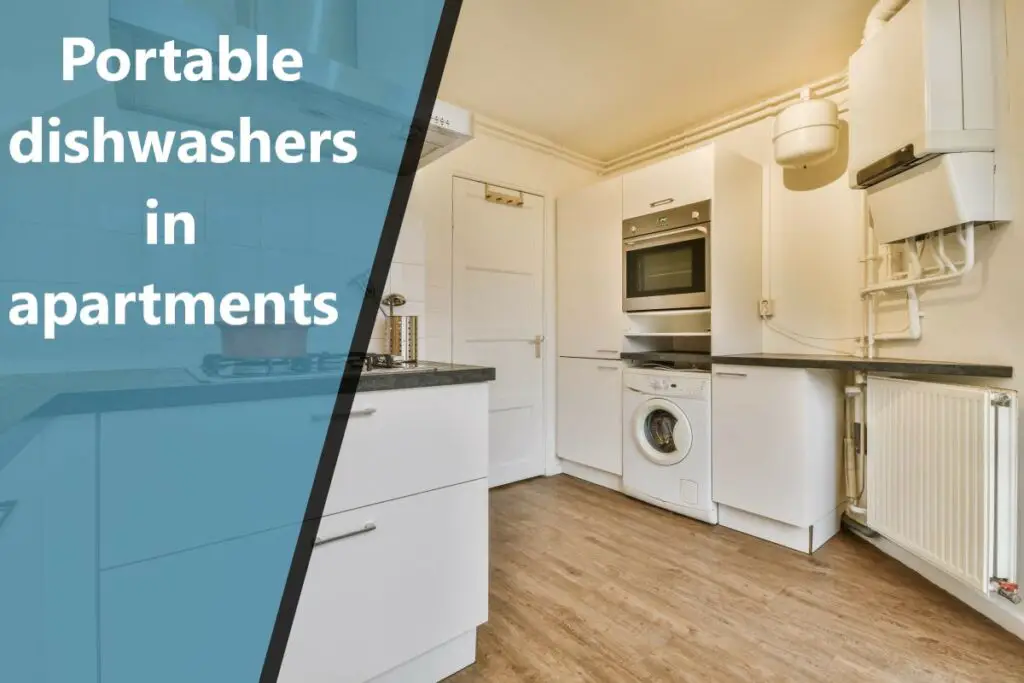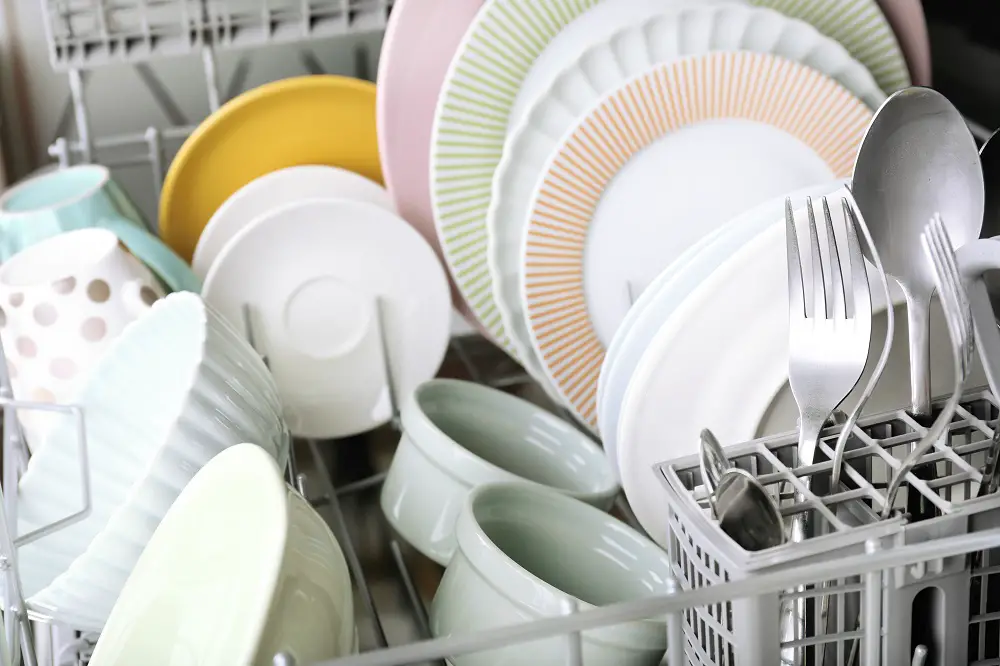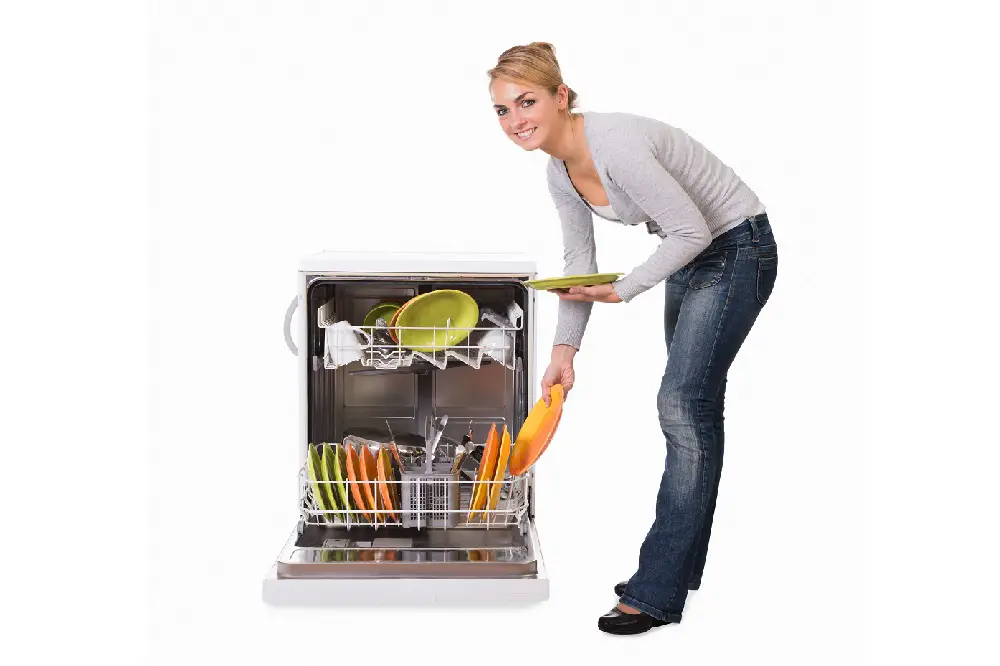Portable dishwashers are a popular choice if you live in a small or rented space that doesn’t have the provision or permit a fully integrated dishwasher. It’s obvious to wonder then, ‘Are portable dishwashers allowed in apartments?’
Not all apartments will allow portable dishwashers. While these appliances may be allowed in some apartments, other apartments may prohibit or restrict their use owing to certain concerns.

Let’s look at whether portable dishwashers are allowed in apartments and why they may be forbidden.
Table of Contents
Are Portable Dishwashers Allowed in Apartments?
Portable dishwashers may be allowed in some apartments. Several factors decide the allowance of these appliances, such as lease agreements, local building codes, and apartment complex policies.
Some apartments allow portable dishwashers, and landlords may even provide one as an amenity in the apartment for tenants.
However, the use of portable dishwashers may be prohibited in other apartments due to concerns about plumbing, noise, and space limitations, among other factors.
As long as the lease has no clause forbidding appliances, keeping a portable dishwasher is legal.
Check the lease agreement or contact the landlord (or apartment management) to know whether portable dishwashers are allowed in the apartment.
Reasons a Portable Dishwasher May Be Forbidden
Certain landlords, building authorities, and tenant boards might not permit the use of a portable dishwasher in an apartment for any of the following reasons:
- Old plumbing system:
Older apartment buildings’ plumbing systems may not be well-equipped to handle the extra water flowing from additional appliances.
- Shared water heater:
If the entire building shares a common water heater, using a portable dishwasher may cause the loss of hot or cold water.
- Shared utility costs:
They increase the apartment’s utility cost, which could be an issue if the landlord pays the apartment’s utility bills.
- Electrical system:
If the apartment’s electrical system isn’t designed to support the power needs of a dishwasher, it may be forbidden to prevent the overloading of circuits.
- Noise:
Portable dishwashers may generate noise during their operation, disturbing neighbors or violating the regulations in place.
- Risk of leaks:
Loose piping or damaged hoses may cause leaks that could damage the apartment floor and the tenants’ apartment below yours.
Do This Before Buying a Portable Dishwasher for Your Apartment
To ensure that you’re allowed to keep a portable dishwasher in your apartment, here are a few steps you can take before buying one:
- Review the lease agreement
Ensure you check your apartment lease agreement for any specific restrictions pertaining to appliances, including dishwashers. Look for clauses that mention whether portable dishwashers are allowed or if there are any limitations on their use.
- Contact the building association, landlord, or apartment manager
Inquire about the apartment policy on portable dishwashers with the landlord, building association members, or apartment manager. Ask if such appliances are allowed and if there are any restrictions that you must be aware of.
- Consider the building’s plumbing situation
If it is an old building, there are likely small drainage pipes that aren’t designed to handle the extra water from a portable dishwasher.
- Consider the building’s water situation
Does the building have a shared hot water line or individual lines? If it’s shared, appliances like a portable dishwasher may not be permitted since they may cause loss of hot/cold water.
- Talk to neighbors
You may ask your neighbors to see if they have portable dishwashers or if there have been any issues with their use.
- Put forth a written request
Seek permission from the concerned authorities to install and use a portable dishwasher in the apartment.
Why You Should Buy a Countertop (And Not a Freestanding Dishwasher)
There are several reasons why buying a countertop model is a better option than getting a freestanding dishwasher.
- Smaller Size:
A countertop is smaller in size and will only occupy kitchen counter space. This is especially beneficial if you have limited floor space in a small apartment or kitchen.
Unsure which small model is good? Check our Best Small Portable Dishwashers.
- Portability:
While freestanding models can be rolled around, countertop dishwashers offer greater portability. You can easily relocate them in your kitchen or take them along when you move to a new apartment.
- Lower impact on the water system:
Countertop models are ideal for handling smaller loads, using much less water for wash cycles. This will result in fewer water problems for the building, whether in terms of water usage or drainage.
- Lower price:
Countertop dishwashers are often more affordable than freestanding dishwashers. If you’re on a budget or don’t require a larger dishwasher, a countertop is a cost-effective option.
- Efficiency:
Countertops generally use less water and energy when compared to freestanding models. This can be a more environmentally friendly and economical choice while helping cut utility bills.
Here’s everything about the efficiency of countertop dishwashers.
- Easy installation:
While portable dishwashers are easier to install than built-in models, countertop dishwashers require minimal installation effort. Often, countertops sit on a dedicated space on the kitchen counter and can also be kept connected to the sink faucet at all times.
Read our article about How To Hook Up A Portable Dishwasher to see how easy it is.
Conclusion
Portable dishwashers make a great choice if you aren’t allowed to install a built-in dishwasher. If you’re wondering, ‘Are portable dishwashers allowed in apartments?’ it’s best to check your apartment’s lease to find out.
While most apartments may allow these appliances, some don’t, owing to old structures or water and electricity restrictions. Before buying a portable dishwasher, consider checking the lease agreement or asking around to be absolutely sure it’s allowed in the apartment.
Between countertops and freestanding models, countertops make a better choice owing to their portability, space efficiency, cost-effectiveness, and convenience for smaller loads.




I really appreciate this breakdown, Martin. Navigating apartment rules for appliances like dishwashers can be tricky, especially in older buildings. I had no idea that building codes could play a part. Thanks for shedding light on this!
Just wondering, wouldn’t a countertop dishwasher take up a lot of kitchen space? Where am I supposed to put this in a cramped kitchen?
MikeT1994, it’s all about making the most of your space. Consider multifunctional furniture or shelving units that can accommodate a dishwasher underneath. It’s a game-changer for small kitchens!
Totally agree on the countertop model being better for apartments. It’s been a lifesaver for me and my busy schedule. Plus, it was easy to move with, which is a huge bonus.
Good points about lease agreements and codes. People often forget to check these and end up in a bind. It’s crucial info.
Had to laugh at the idea of fitting a freestanding dishwasher in my shoebox apartment. The countertop model is a game-changer, though. Highly recommend!
Great read! Always check with your landlord first, folks! Saves a lot of hassle down the road.
Interesting to see how much goes into deciding on a portable dishwasher. Makes me appreciate my tiny, but efficient kitchen setup even more.
I think there’s a bit more to consider when choosing between countertop and freestanding models, like water usage and efficiency. Still, a good starting point for people unfamiliar with the options.
Does anyone know how energy-efficient these portable dishwashers are? Trying to make eco-friendly choices and wondering if these fit the bill.
EcoWarrior92, most modern portable dishwashers are quite energy-efficient, some even have eco-friendly settings. Be sure to look for the Energy Star label when shopping!
Fascinating how the evolution of appliances like dishwashers reflects changes in our living spaces and lifestyles. This article touches on important considerations but also speaks to a larger trend of maximizing convenience in smaller living areas. It would be interesting to delve deeper into how technology continues to adapt to our changing needs.